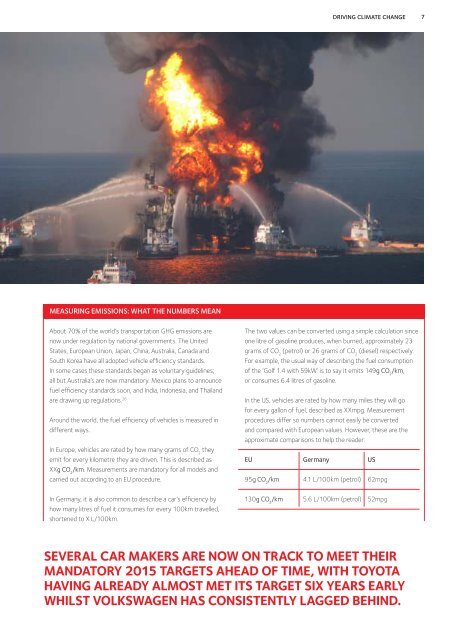The Dark Side of Volkswagen - Greenpeace
The Dark Side of Volkswagen - Greenpeace
The Dark Side of Volkswagen - Greenpeace
You also want an ePaper? Increase the reach of your titles
YUMPU automatically turns print PDFs into web optimized ePapers that Google loves.
MEASURING EMISSIONS: WHAT THE NUMBERS MEAN<br />
About 70% <strong>of</strong> the world’s transportation GHG emissions are<br />
now under regulation by national governments. <strong>The</strong> United<br />
States, European Union, Japan, China, Australia, Canada and<br />
South Korea have all adopted vehicle efficiency standards.<br />
In some cases these standards began as voluntary guidelines;<br />
all but Australia’s are now mandatory. Mexico plans to announce<br />
fuel efficiency standards soon, and India, Indonesia, and Thailand<br />
are drawing up regulations. 26<br />
Around the world, the fuel efficiency <strong>of</strong> vehicles is measured in<br />
different ways.<br />
In Europe, vehicles are rated by how many grams <strong>of</strong> CO 2 they<br />
emit for every kilometre they are driven. This is described as<br />
XXg CO 2 /km. Measurements are mandatory for all models and<br />
carried out according to an EU procedure.<br />
In Germany, it is also common to describe a car’s efficiency by<br />
how many litres <strong>of</strong> fuel it consumes for every 100km travelled,<br />
shortened to X L/100km.<br />
DRIVING CLIMATE CHANGE<br />
<strong>The</strong> two values can be converted using a simple calculation since<br />
one litre <strong>of</strong> gasoline produces, when burned, approximately 23<br />
grams <strong>of</strong> CO 2 (petrol) or 26 grams <strong>of</strong> CO 2 (diesel) respectively.<br />
For example, the usual way <strong>of</strong> describing the fuel consumption<br />
<strong>of</strong> the ‘Golf 1.4 with 59kW’ is to say it emits 149g CO 2 /km,<br />
or consumes 6.4 litres <strong>of</strong> gasoline.<br />
In the US, vehicles are rated by how many miles they will go<br />
for every gallon <strong>of</strong> fuel, described as XXmpg. Measurement<br />
procedures differ so numbers cannot easily be converted<br />
and compared with European values. However, these are the<br />
approximate comparisons to help the reader:<br />
EU Germany US<br />
95g CO 2 /km 4.1 L/100km (petrol) 62mpg<br />
130g CO 2 /km 5.6 L/100km (petrol) 52mpg<br />
SEVERAl CAR MAKERS ARE now on TRACK To MEET ThEiR<br />
MAndAToRY 2015 TARgETS AhEAd oF TiME, wiTh ToYoTA<br />
hAVing AlREAdY AlMoST MET iTS TARgET Six YEARS EARlY<br />
whilST VolKSwAgEn hAS ConSiSTEnTlY lAggEd bEhind.<br />
7

















